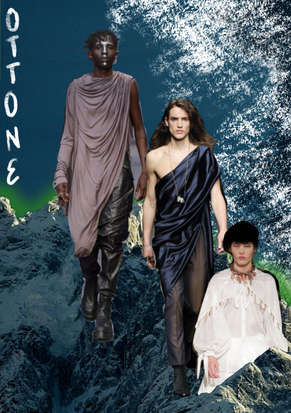
Conceptual design project.
By Claudio Monteverdi
Designer Theo Wyatt
''The beautiful Poppea has caught the eye of the emperor Nerone (Nero), and he has fallen devotedly in love with her. He believes his wife, Ottavia, is barren, and the coldness she offers him is in such opposition to Poppea’s open warmth and affection. The decision is easy: he intends to make Poppea his wife, making her empress of Rome. Carrying out this task simply means removing any obstacles in his way, like his wife, and the old moralising philosopher, Seneca.'' Designing for end stage proscenium arch (The Richard Burton Theatre).
- RESEARCH AND DEVELOPMENT -
I was drawn to the themes of power, betrayal, lust, and politics, necessitating creating a feeling of grandeur and power in the design, and some element of the classical antique setting of the story.
- INITIAL RESPONSE-

My initial visual response drew me to a feeling of boldness (particularly a strong red), dynamic relationships, and the feeling of levels and light.
- RESEARCH -
.png)

Visual research through mood boards.
Drawn to large dynamic architecture - creating a feeling of scale and power. To create that feeling in the space (The Richard Burton Theatre), an element of abstract shape was needed.
In the costumes my initial instinct was to Greco-Roman 'feeling' costumes, leaning into modern fashion interpretations; an interpretation, of an interpretation of, Antique clothing - abstracted to meet the more abstract physical world I was being drawn to.
- DEVELOPMENT -



Design development through illustration, mood board, and image collage. Experimenting with different large-scale architectures, and character definitions in costumes characterized by large swathes of fabric and long lines.
Early set drawings done digitally on Procreate (above). Costume development done through individual characters mood boards, sketches, and collages (below).


- SET MODEL AND STORYBOARD -



Final Physical 1:25 Model Set Design.
Through the model-making process, I brought back the bold colours and through the white card model process defined the key spaces and their (conceptual) functionality in the piece (e.g. the crescent being the 'speaking place of the gods'.
Model box in various settings & storyboards images.



























